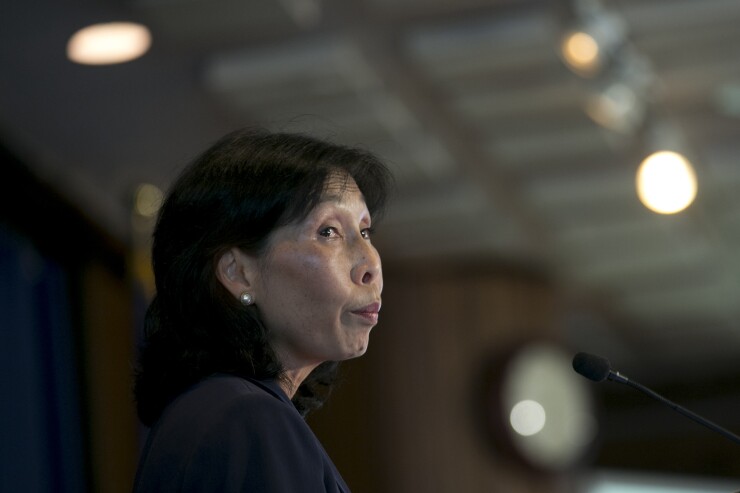WASHINGTON — The Senate is expected Tuesday to move one step closer to confirming Michelle Bowman, the Kansas state banking regulator, to the Federal Reserve Board. But the nominations for two other open Fed seats on the seven-person board are still in limbo.
A
Bowman was

Observers said the slowdown may have something to do with the Trump administration and the GOP-controlled Senate not being on the same page about Fed nominees and the calendar for confirming them.
“I think one needs to separate the two different parts of it — what the Trump White House will do and what McConnell and Senate Republicans might do,” said Ian Katz, an analyst for Capital Alpha Partners, referring to Mitch McConnell, the Senate majority leader. “Those two sides don't necessarily agree on all nominations.”
Bowman was appointed as the Kansas banking commissioner in January 2017 and had previously served as a vice president at Farmers and Drovers Bank in Council Grove, Kan., since 2010.
Liang, a former Fed official who helped develop the central bank's post-crisis supervisory program for large institutions, was
Congress may not complete their nominations before the end of its current session. The nominations expire at the end of the current Congress, and so the White House would either have to renominate Liang and Goodfriend, or pick someone else for either vacancy.
Liang, meanwhile, is facing some
President Trump’s former campaign manager, Corey Lewandowski, said in an
Goodfriend’s nomination has been pending for almost a year in part because of opposition from both Senate Democrats — highlighted in a
Justin Schardin, acting director of the Financial Regulatory Reform Initiative at the Bipartisan Policy Center, said the White House would likely renominate Liang simply because she has not yet had a Senate hearing.
“With Liang, I would assume she would be renominated because she was so recently nominated and it took a while to make that decision, so it would be odd to change that decision now," Schardin said.
The future of both nominees hinges in part on whether there are enough votes in the Senate to confirm them, especially in the case of Goodfriend. With the GOP holding such a slim majority in the Senate, Paul's opposition could be enough to block the nominee. The GOP could expand that majority by up to two votes if Republican Gov. Rick Scott holds on to win the close Florida Senate race, which is headed for a recount, and Republican Cindy Hyde-Smith wins a runoff election in Mississippi at the end of the month.
"With Goodfriend, the question is, does one or two new Republican senators make it likely that he can get confirmed,” Schardin said.
But Katz said these nominations could also continue to remain pending for a long time after the 116th Congress convenes in January. If Republicans continue to oppose Liang, for example, they could slow-walk her nomination even if it is reintroduced in January, and the Fed will simply carry on with five members.
It's "hard to say whether the White House will renominate them, but there's no urgency to do that, and there's no urgency for the Senate to act even if they are renominated,” Katz said. “It wouldn't surprise me at all if the Fed has five governors for many more months. This doesn't have to get resolved soon.”
Adam Gilbert, global regulatory leader of the Financial Services Advisory Practice at PricewaterhouseCoopers, said the Fed would almost certainly welcome and prefer that the remaining two nominees be confirmed, but is unlikely to make much of a fuss if they remain pending.
Although President Trump has lobbed
“From an institutional perspective, they don’t want any circus or political exercise over the nominees ... because the first thing the Fed cares about most is protecting the institution,” Gilbert said. “I would think the less limelight about this, from their standpoint, the better. They don’t want to further politicize the institution when the White House is taking a public stance that is more assertive than other administrations.”





